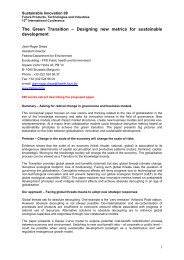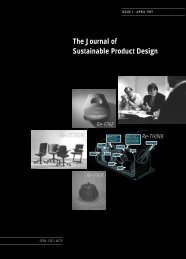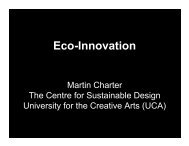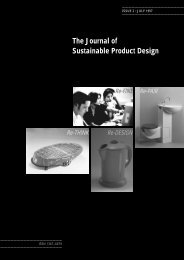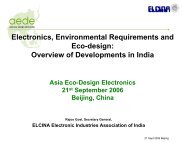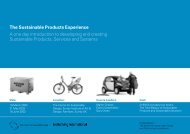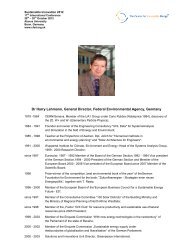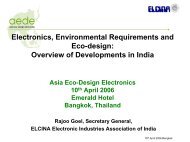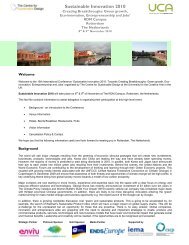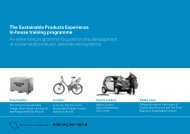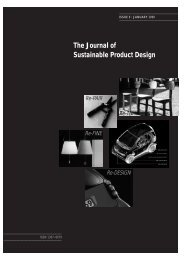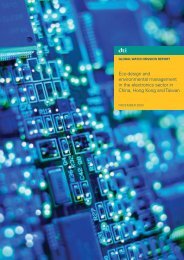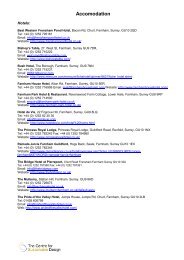Country report on the Indian electronics sector - The Centre for ...
Country report on the Indian electronics sector - The Centre for ...
Country report on the Indian electronics sector - The Centre for ...
Create successful ePaper yourself
Turn your PDF publications into a flip-book with our unique Google optimized e-Paper software.
10 · Asia Eco-Design Electr<strong>on</strong>ics (AEDE)<br />
3Rs. <strong>The</strong> GPL applies to government purchasing and aims<br />
to create a green market <strong>for</strong> a number of publicly procured<br />
products. <strong>The</strong> Waste Management Law applies to resp<strong>on</strong>sible<br />
and appropriate methods of disposal of waste. Japan has<br />
emphasised creati<strong>on</strong> of a recycling ec<strong>on</strong>omy to minimise <strong>the</strong><br />
use of materials and energy.<br />
<strong>The</strong> Fundamental Law was en<strong>for</strong>ced from January 2001 and<br />
establishes <strong>the</strong> principles under which o<strong>the</strong>r envir<strong>on</strong>mental<br />
legislati<strong>on</strong> is expected to operate. This law outlines <strong>the</strong><br />
resp<strong>on</strong>sibilities of <strong>the</strong> different <strong>sector</strong>s.<br />
<strong>The</strong> Waste Management Law and LPEUR are subject to <strong>the</strong><br />
Fundamental Law and govern <strong>the</strong> practical applicati<strong>on</strong> and<br />
details of <strong>the</strong>se regulati<strong>on</strong>s. <strong>The</strong> Waste Management Law<br />
basically deals with disposal whilst <strong>the</strong> LPEUR deals with <strong>the</strong><br />
3Rs through specific product-related regulati<strong>on</strong>.<br />
Hazardous substances in EEE and WEEE are not specifically<br />
covered within this framework of waste legislati<strong>on</strong> but Japan<br />
has drafted its own versi<strong>on</strong> of RoHS and this was implemented<br />
in 2006. However, from <strong>the</strong> late 90s voluntary agreements were<br />
in place.<br />
Although LPEUR and HARL are stated to be based <strong>on</strong><br />
‘producer resp<strong>on</strong>sibility’ <strong>the</strong>re is a major element of ‘c<strong>on</strong>sumer<br />
resp<strong>on</strong>sibility’ since c<strong>on</strong>sumers pay <strong>for</strong> <strong>the</strong> schemes. In this<br />
sense <strong>the</strong>y differ from WEEE, which is wholly paid <strong>for</strong> by<br />
producers.<br />
<strong>The</strong> Green Purchasing Law was paased in 2001 to establish<br />
green purchasing as a nati<strong>on</strong>al policy. This law mandates that<br />
all governmental bodies must c<strong>on</strong>duct green purchasing, must<br />
create and publicise its purchasing policy each year and <str<strong>on</strong>g>report</str<strong>on</strong>g><br />
purchasing records. <strong>The</strong>re are over 150 items <strong>on</strong> <strong>the</strong> list which<br />
includes office equipment, lighting and electrical goods. This<br />
Law complements and supports voluntary purchasing initiatives<br />
such as <strong>the</strong> Green Purchasing Network, established in 1996.<br />
<strong>The</strong> HARL legislati<strong>on</strong> was passed in 2001 and gives <strong>the</strong><br />
producers – manufacturers and importers – of four domestic<br />
appliance types, <strong>the</strong> resp<strong>on</strong>sibility of providing a nati<strong>on</strong>al takeback<br />
scheme and <strong>the</strong> objective of achieving recycling targets.<br />
It includes air c<strong>on</strong>diti<strong>on</strong>ers, washing machines, televisi<strong>on</strong>s and<br />
fridges/freezers as <strong>the</strong> items where <strong>the</strong> greatest envir<strong>on</strong>mental<br />
benefit could be achieved by resp<strong>on</strong>sible recycling. Some new<br />
categories are under c<strong>on</strong>siderati<strong>on</strong> and may be added so<strong>on</strong>.<br />
Sustainable waste management has been <strong>on</strong>e of <strong>the</strong> key drivers<br />
<strong>for</strong> envir<strong>on</strong>mental initiatives and legislati<strong>on</strong> in Japan <strong>for</strong> <strong>the</strong> last<br />
20 years with its enormous manufacturing base and limited<br />
natural disposal opti<strong>on</strong>s. Existing landfill space is due to run<br />
out in 2008 and <strong>the</strong> government has been following a planned<br />
strategy since <strong>the</strong> early 90s under <strong>the</strong> basic 3Rs – Reduce,<br />
Reuse, Recycle.<br />
With huge generati<strong>on</strong> of electr<strong>on</strong>ic waste (and o<strong>the</strong>r types of<br />
waste) <strong>the</strong> country has been seeking to reduce dependency<br />
<strong>on</strong> both natural resources and land disposal, and to mitigate<br />
society’s envir<strong>on</strong>mental impact. Japan has been successful in<br />
making sustainable envir<strong>on</strong>mental development an essential<br />
part of ec<strong>on</strong>omic progress. It has been able to disperse this<br />
culture into <strong>the</strong> Japanese industry which has in turn integrated<br />
sustainable development into its R&D and design polices.<br />
2.2 <strong>Indian</strong> legislati<strong>on</strong><br />
<strong>The</strong> Ministry of Envir<strong>on</strong>ment and Forests (MoEF) is <strong>the</strong><br />
nati<strong>on</strong>al authority resp<strong>on</strong>sible <strong>for</strong> legislati<strong>on</strong> regarding waste<br />
management and envir<strong>on</strong>mental protecti<strong>on</strong>. However, as of<br />
date, hazardous waste management laws do not regulate<br />
e-waste and local governments who are resp<strong>on</strong>sible <strong>for</strong> <strong>the</strong><br />
collecti<strong>on</strong> and disposal of municipal solid waste, play no role in<br />
<strong>the</strong> collecti<strong>on</strong> or disposal of e-waste.<br />
Hazardous waste in India is managed under <strong>the</strong> Hazardous<br />
Wastes (Management and Handling) Amendment Rules, 2003<br />
which amends <strong>the</strong> original rules, namely <strong>the</strong> Hazardous Wastes<br />
(Management and Handling) Rules, 1989. <strong>The</strong>se rules cover<br />
all types of hazardous wastes and gives a comprehensive list<br />
of industries and products covered. <strong>The</strong> amendment in 2003<br />
added lead acid batteries to <strong>the</strong>se rules which are also covered<br />
under <strong>the</strong> Batteries (Management and Handling) Rules, 2001<br />
made under <strong>the</strong> Envir<strong>on</strong>ment (Protecti<strong>on</strong>) Act, 1986.<br />
Schedule 2 of <strong>the</strong>se rules lists <strong>the</strong> Wastes C<strong>on</strong>stituents<br />
with c<strong>on</strong>centrati<strong>on</strong> limits based <strong>on</strong> BAGA (<strong>the</strong> Ne<strong>the</strong>rlands<br />
Protecti<strong>on</strong> Agency) List of Hazardous Substances. Schedule 3<br />
Part A <strong>on</strong> List of Waste Applicable <strong>for</strong> Import and Export which<br />
includes List A1: Metal and Metal Bearing Waste lists out items<br />
related to electrical and electr<strong>on</strong>ic products, lead acid batteries,<br />
cathode ray tubes, PCB’s, capacitors etc.<br />
Polluti<strong>on</strong> c<strong>on</strong>trol is a subject under <strong>the</strong> MoEF and all such rules<br />
governed by MoEF are en<strong>for</strong>ced by State Polluti<strong>on</strong> C<strong>on</strong>trol<br />
Boards. <strong>The</strong> Central Polluti<strong>on</strong> C<strong>on</strong>trol Board (CPCB) is <strong>the</strong><br />
nodal authority under <strong>the</strong> MoEF resp<strong>on</strong>sible <strong>for</strong> en<strong>for</strong>cement<br />
of envir<strong>on</strong>ment protecti<strong>on</strong> laws and is assisted by <strong>the</strong> State<br />
Polluti<strong>on</strong> C<strong>on</strong>trol Boards (SPCBs). <strong>The</strong> CPCB is also <strong>for</strong>mulating<br />
a Charter <strong>on</strong> Corporate Resp<strong>on</strong>sibility <strong>for</strong> Envir<strong>on</strong>mental<br />
Protecti<strong>on</strong> (CREP).<br />
All industrial units with potential <strong>for</strong> causing polluti<strong>on</strong> of any<br />
kind need a No Objecti<strong>on</strong> Certificate from <strong>the</strong> Polluti<strong>on</strong> C<strong>on</strong>trol<br />
Board. <strong>The</strong>se certificates are issued after c<strong>on</strong>ducting an<br />
envir<strong>on</strong>ment impact study of <strong>the</strong> proposed unit.<br />
A WEEE legislati<strong>on</strong> called <strong>The</strong> WEEE (Management and<br />
Handling) Rules, 2006, is being drafted and was presented <strong>for</strong><br />
deliberati<strong>on</strong>s at <strong>the</strong> Nati<strong>on</strong>al E-Waste Legislati<strong>on</strong> Workshop <strong>on</strong>



